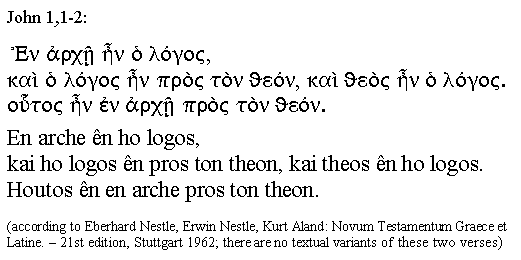
Al-Kadhi writes:
That's utmost nonsense.
Firstly, St. John the Evangelist, of course, spoke Greek. The use of the Greek language was very common in the Palestine of those days, and later St. John was living in a Greek speaking country and addressing an Greek speaking audience and public.
Secondly, there is no idea that the fourth gospel were not originally written in Greek language.
Thirdly, as far as I know, not only all manuscripts and fragments of St. John's gospel containing the passage John 1:1 but also all quotations by the early Christian theologians without any variants in John 1:1-2 have the following Greek text (with transliteration into Latin characters):

Please note: There is no "ton theos", as Al-Kadhi asserts. Both sentences have "ton theon", and that's no surprise: It is the accusative, the nominative of which is "ho theos" = "the God", and the words must be in accusative, since they are dependent on the preposition "pros" = "at", "with" or something like that, dependent on the context.
Therefore the common and correct translation reads:
"In the beginning was the Word, and the Word was with God, and God was the Word. This was in the beginning with God."
(I beg the pardon of native English speakers, if my English style happens to be not so pleasant.)
Nobody should make much ado about the article ("ho" in nominative, "ton" in accusative, both to be translated as "the" in English): Making use of an article in Old Greek didn't follow the rules of the English grammar. The omission of the article doesn't imply any collective or abstract meaning in the -- in Old Greek impossible -- sense of "theos" = "something divine". On the contrary, it conveys the connotation of a proper name. The Greek word for "divine" is "theios, theia, theion", dependent on the gender this adjective is attributed to.
To sum up: Al-Kadhi is utterly wrong, and there is no reason not to realize that the passage John 1:1-2 actually states that Jesus Christ is God, namely the second person of the Holy Trinity, being one God.
Al-Kadhi claims a number of "Christian" scholars and their translations as being in support of his contortions, but enough is already said elsewhere about Powis Smith, Moffat & Co. in regard to scholarship and bias in their translations.
Where does the author get this strange claim from?
Mr. Al-Kadhi has acknowledged his indebtedness to Ahmed Deedat in the preface to this book, and it comes to bear greatly in this case. This section in particular reveals gross ignorance about the topic and a complete lack of even the most elementary facts of Greek grammar.
He basically copied this mistake speaking about "ton theos" from Ahmed Deedat. Deedat has no understanding of the Biblical languages and probably never read a serious commentary. But Mr. Al-Kadhi has supposedly read a number of academic commentaries. Strangly he overlooked (a) all those which are contrary to his predecided opinion, and (b) that in none of these commentaries or translations he quoted did he ever find the phrase "ton theos". This is from Deedat and from Deedat only whom Mr. Al-Kadhi seems to take as one of his highest authority on the Bible.
The Rebuttal to "What Did Jesus Really Say?"
Answering Islam Home Page